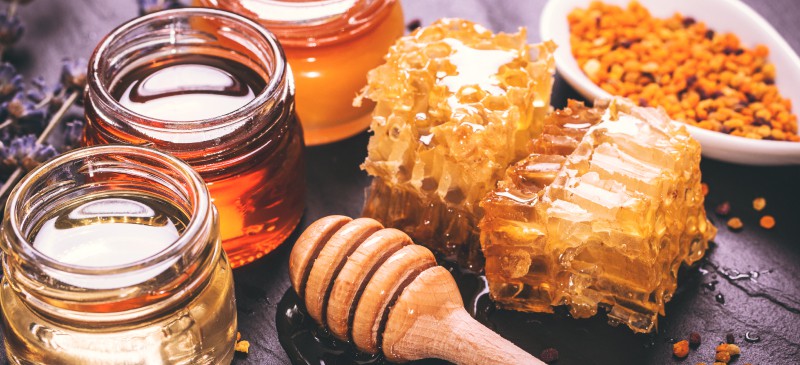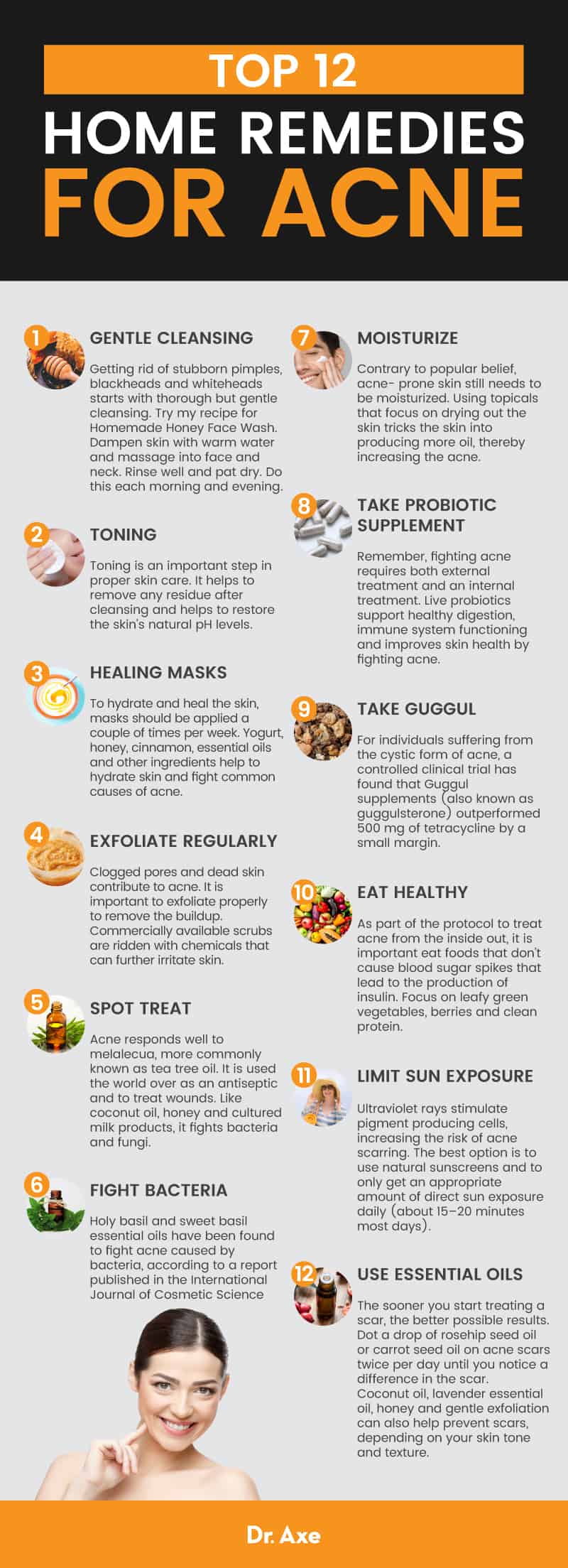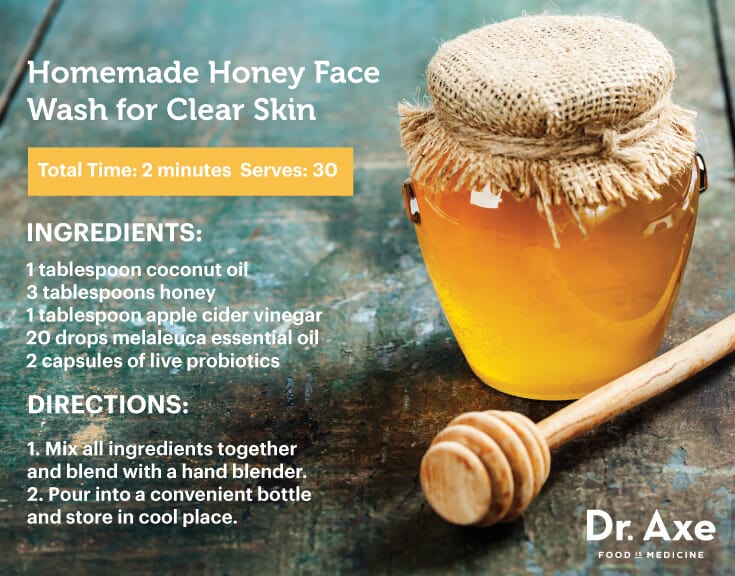by Kathleen McCoy, BS
Published: August 2, 2018
 Our skin is a reflection of our overall health, which is why glowing, beautiful skin often results from proper care, hydration and eating a nutrient-dense diet. On the other hand, skin ridden with whiteheads, blackheads and other types of pimples can indicate oxidative damage, poor nutrition and hormonal imbalances.
Our skin is a reflection of our overall health, which is why glowing, beautiful skin often results from proper care, hydration and eating a nutrient-dense diet. On the other hand, skin ridden with whiteheads, blackheads and other types of pimples can indicate oxidative damage, poor nutrition and hormonal imbalances.
According to the American Academy of Dermatology, acne is the most common skin condition in the United States. (1) Occasional breakouts and chronic acne plague tens of millions of Americans of all ages every year. About 85 percent of teens experience some type of acne, but even many adults deal with at least occasional breakouts too. About half of teens and young adults suffering from acne will have severe enough symptoms to seek out professional help from a dermatologist.
From mild to severe, acne can cause painful and unsightly outbreaks on the face, back, chest and even arms. Left untreated, acne can also lead to diminished self-esteem and long-term hyperpigmentation or scarring. Genetics, changing hormone levels, lack of sleep and stress are all contributing factors to acne.
The good news is this: many safe home remedies for acne, blackheads, whiteheads, and hyperpigmentation due to acne scars are all available. Below I’m sharing my favorite natural home remedies for getting rid of pimples and keeping them from returning. If you’re someone who has chosen to use potentially dangerous prescription drugs and/or topical medications on your skin, instead of natural home remedies for acne, then know that clearing your skin naturally is possible, as is minimizing acne scars. A healthy diet, applying essential oils, proper gentle cleansing and balancing hormones are all home remedies for acne you can restore your skin’s health, reduce unsightly pimples or other types of irritation, and prevent scars.
What Is Acne?
Acne vulgaris is the term for a group of skin conditions that cause most acne pimples. (2) Acne is typically categorized into two main types: non-inflammatory and inflammatory acne. Acne is also described as mild, moderate or severe acne, or sometimes given a grade of either grade I, II, III or IV acne. (3)
The main types of acne include:
- Non-inflammatory acne—characterized by whiteheads and blackheads, but not cysts/nodules.
- Inflammatory acne— usually caused by small infections due to P. Acnes bacteria.
- Cystic acne (also called nodulocystic acne)— an intense form of acne that results in large, inflamed cysts and nodules that appear on the skin
- Acne Fulminans— a severe form of inflammatory acne that usually affects adolescent males on jaw, chest and back.
- Acne Mechanica:— triggered by excess pressure, heat, and friction. Often affects athletes, causing small bumps and some inflamed lesions.
Here is how acne is graded depending on the type of symptoms it causes:
- Grade I— causes mild whiteheads, blackheads, and small pimples that are not inflamed.
- Grade II— Moderate acne that causes frequent breakouts of pustules and papules.
- Grade III— large amount of inflammation, numerous papules and pustules, and some nodules.
- Grade IV— the most severe form of acne, causing many nodules, cysts, pustules, and papules that often appear on the face, back, chest, neck, and buttocks.
Signs & Symptoms of Acne
Acne symptoms will depend on the specific type of acne someone has and the underlying cause of the skin irritation/inflammation. The most common symptoms that acne causes include: (4)
- Blackheads, or small black dots on the skin, usually around the nose, forehead or chin. These are also called “comedones” and result from debris getting trapped inside of a follicle.
- Whiteheads, which can form when pus builds under the skin and forms a “head”. These result from follicles getting plugged with sebum and dead skin cells.
- Papules and pustules (the technical name for pimples) which cause small or medium sized bumps on the skin that are round, red and don’t always have a visible “head”. These are caused by “moderate” types of acne and are not as severe as cysts or nodules. (5)
- Cysts or nodules, which are severe pimples that are infected and painful. They can form within deeper layers of the skin, become very swollen or tender, and take longer to heal then papules and pustules.
- Dark spots on the skin (hyperpigmentation).
- Scars, most often left behind from nodules or cysts, especially if they have been “popped” or picked.
- Increased sensitivity to products, heat, sweat and sunlight.
- Decreased self esteem, self consciousness, anxiety and depression.
Common Causes of Acne
The main causes of acne include:
- Clogged pores, caused by things like excess oil production and dead skin cells. Sebum is the type of oil released into hair follicles that can become trapped beneath surface of the skin and clog pores.
- Bacteria.
- Hormone fluctuations or imbalances. For example, when androgen hormones increase oil production rises. This often happens in teens and young adults suffering from acne, especially women experiencing PMS, irregular periods, pregnancy, early menopause, and other hormonal conditions such as poly cystic ovarian syndrome (PCOS).
- Poor diet, such as the “Standard American Diet” that includes lots of refined grains, sugar and unhealthy fats.
- High amounts of stress and related problems like psychiatric disorders such as depression and anxiety.
- Use of certain medications, including corticosteroids, androgens, birth control pills and lithium (6).
- Sleep deprivation.
- Friction and irritation to the skin, such as from sports equipment and backpacks that can lead to acne breakouts on the chin, forehead, jawline and back.
- Genetic predisposition.
- Smoking and other causes of inflammation.
Once believed to strike most often during teen years, acne is now affecting millions of adult women, many of which never had a problem with acne in the past. Some women (and men too) will only deal with acne during puberty and their teenage years, but others will suffer well into adulthood, especially during times of stress and hormonal changes. While acne among adult women is usually linked to hormonal shifts and imbalances that occur during the menstrual cycle, or when transitioning into menopause, it’s important to consider elevated stress levels, a lack of sleep and a poor diet might also be root causes.
A review published in the Archives of Dermatological Research found evidence that sleep deprivation, stress and other aspects of “modern life” are linked to adult female acne. The researchers point out that “Modern life presents many stresses including urban noises, socioeconomic pressures and light stimuli. Women are especially affected by stress during daily routine. Women also have a higher risk of developing psychiatric disorders such as depression and anxiety. Sleep restriction is added to these factors, with several negative consequences on health, including on hormonal secretion and the immune system.” (7)
Conventional Treatments for Acne
Most people either choose to live with acne, or out of frustration turn to medications or chemical treatments that often have side effects or simply don’t work at all. Dermatologists can prescribe medications to treat acne, including gels, lotions, cleansers and even antibiotics. The harsh chemicals used in over-the-counter and prescription acne products can cause further irritation to already-sensitive or inflamed skin, so using these is not always the best option, or safe for continued use.
According to doctors, which is the best medicine for treating acne?
- Two ingredients used in many acne treatments are called benzoyl peroxide and salicylic acid. Concentrated vitamin A derivatives are also sometimes used, in addition to sulfur or zinc compounds.
- Benzoyl peroxide helps kill bacteria found inside pores, which helps prevent pore clogging. This can reduce infections, redness and inflammation, but sometimes causes negative reactions like dryness, burning and peeling. Always start with a lower concentration to test your reaction, such as a lotion with 2.5 percent benzoyl peroxide.
- Salicylic acid is another common active ingredient that helps remove excess cells that trap sebum and bacteria inside pores. It can also cause redness and dryness, especially on sensitive skin. Start with a product containing 0.5 percent to 3 percent salicylic acid.
- Dermatologists sometimes prescribe antibiotics to help reduce the amount of bacteria getting trapped inside pores. Examples of antibiotics prescribed to treat acne include clindamycin, doxycycline, erythromycin, and tetracycline. (8)
- Once acne is resolved, how do dermatologists remove acne scars? A peel might be recommended to remove the appearance of dark spots or scars, such as a glycolic peel. Peels and other acne treatments can increase photo-sensitivity, so you’ll need to protect your skin from the sun.
12 Best Home Remedies for Acne & Acne Scars
Everyone’s skin is different, so keep in mind that effectively treating acne breakouts at home requires a multi-disciplinary approach. The home remedies for acne described below can be used in combination to provide the best results. However, keep in mind that while you overcome acne it’s also very important to avoid the biggest mistakes that can make skin irritation or scarring worse:
- Picking blemishes
- Over cleansing with harsh chemicals and cleansers
- Believing only topical care of the skin is necessary to fight acne
- Not giving skin the chance to adapt to new care
- Failing to stay properly hydrated
- Failing to start treating acne from the inside, out
1. Cleanse Gently
Getting rid of stubborn pimples, blackheads and whiteheads starts with thorough but gentle cleansing of the skin. Try my recipe for Homemade Honey Face Wash to cleanse skin without causing irritation. It features apple cider vinegar, honey, coconut oil, probiotics and essential oils (like tea tree oil). The honey soothes the skin, the coconut oil helps to fight bacteria and fungus, and the tea tree oil helps to invigorate the skin. Dampen skin with warm water, and massage into face and neck. Rinse well and pat dry. Do this each morning and evening and, if needed, after workouts. Refrain from cleansing more often, as this can irritate the skin and cause an overproduction of oil.
If you find that acne appears around your hairline, commercial hair products may be to blame. Shampoo, conditioner, hair spray, gels and mousses contain acne-causing ingredients, including petroleum, parabens, silicone, sulfates, panthenol and other chemicals. Try my Homemade Honey Citrus Shampoo that is void of harmful chemicals and leaves hair soft and manageable. Follow with a touch of coconut oil or my Homemade Conditioner made from apple cider vinegar and essential oils.
Like hair products, makeup and skin care products contain ingredients that can cause acne. Common offenders include lanolin, mineral oil, aluminum, retinyl acetate, alcohol, oxybenzone, triclosan, parabens, polyethylene, BHA and BHT, and formaldehyde-based preservatives. Read ingredient labels to avoid putting these types of chemicals on your sensitive skin.
2. Tone to Restore pH Balance
Toning is an important step in proper skin care. It helps to remove any residue after cleansing and helps to restore the skin’s natural pH levels.
You can use pure apple cider vinegar (with the mother culture) as your evening and morning toner. Apple cider vinegar is packed with potassium, magnesium, acetic acid and various enzymes that kill bacteria on the skin. Chronic acne can be the result of bacteria and fungi that continue to spread and grow on the surface of the skin. With a cotton ball, smooth ACV over skin paying particular attention to active breakouts and acne prone areas.

Source: Read more at Draxe




GIPHY App Key not set. Please check settings